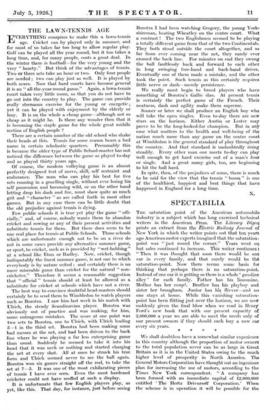THE LAWN-TENNIS AGE
VVERYTHING conspires to- make this a lawn-tennis -12.4 age. Cricket can by played only in summer, and for most of `us takes far too long to allow regular play. Golf can•be played all the year round, big it too takes a long time, and, for many people, costs a great deal. In the winter there is football—for the very young and the Very "hearty.". But think of the advantages of tennis. Two or three sets take an hour or two. Only four people are needed ; two can play just as well. It is played by both sexes. Now that hard courts have become general it is an " all-the-year-round game." Again, a lawn-tennis Court takes very little room, so that you do not have to go out into the country to play. The game can provide really strenuous exercise for the young or energetic ; yet it can be played with enjoyment by the elderly or lazy. It is on the whole a cheap game—although not so cheap as it might be. Is there, any wonder then that it is becoming the staple game for the whole great middle Section of English people ?
There are a certain number of the old school who shake their heads at this. Tennis for some reason bears a bad name in certain scholastic quarters. Presumably this is because the older type of Public School-master has not noticed the difference between the game as played to-day and as played thirty years ago.
Of course, the modern volleying game is an almost perfectly designed test of nerve, skill, self restraint and endurance. The man who can play his best for five sets running in a gruelling single, without ever losing his self possession and becoming wild, or on the other hanct letting drop his dash and fire, must show quite as much grit and "character "as are called forth in most other games. But in any case there can be little doubt that the old prejudice against tennis is dying.
Few public schools it is true yet play the game "offi- cially," and, of course, nobody wants them to abandon cricket and rowing or any of their present activities and substitute tennis for them. But there does seem to be one real place for tennis at Public Schools. Those schools which are unfortunate enough not to be on a river do not in some cases provide any alternative summer game, or sport, to cricket, such as is provided by "wet-bobbing" at a school like Eton or Radley. Now, cricket, though indisputably the finest summer game, is not one to which everybody is by nature suited ; and certainly there is no more miserable game than cricket for the natural "non- cricketer." Therefore it seems a reasonable suggestion that " official " tennis should at least be allowed as a Substitute for cricket at schools which have not a river.
The best way to convince doubtful head-masters should certainly be to send them to Wimbledon to watch players such as Borotra. I saw him last week in his match with Ulrich, the steady Scandinavian player. Borotra was obviously out of practice and was making, for him, some outrageous mistakes. The score at one point was two sets to Borotra, one to Ulrich, with Ulrich leading 5-1 in the third set. Borotra had been making some bad messes at the net, and had been driven to the back line where he was playing a far less enterprising game than usual. Suddenly he seemed to take it into his head that it was neck or nothing and started charging the net at every shot. All at once he struck his true form and Ulrich seemed never to see the ball again. Borotra won six games straight off the reel, to take the Set at 7-5. It was one of the most exhilarating pieces Of tennis I have ever seen. Even the most hardened cricketer could not have scoffed at such a display.
It is unfortunate that few English players play, as yet, like this. That day, for instance, just before seeing Borotra I had been watching Gregory, the young York- shireman, beating Wheatley on the centre court. What a contrast ! The two Englishmen seemed to be playing a totally different game from that of the two Continentals. They both stood outside the court altogether, and so far from ever coming near the net, they rarely ever crossed the back line. For minutes on end they swung the ball faultlessly back and forward to each other in long swinging fore-hand and back-hand drives. Eventually one of them made a mistake, and the other took the point. Such tennis as this certainly requires little nerve or dash—merely persistence.
We really must begin to breed players who have something of Borotra's Gallic awl. At present tennis is certainly the perfect game of the French. Their neatness, dash and agility make them supreme.
Sooner or later we shall produce an English boy who will take the open singles. Even to-day there are new stars on the horizon. Either Austin or Lester may prove to be the long-looked-for champion. But in anY case what matters to the health and well-being of the nation much more than any game on the centre court at Wimbledon is the general standard of play throughout the country. And that standard is undoubtedly rising steadily. Every other man one meets to-day can play well enough to get hard exercise out of a man's four or single. And a great many girls, too, are beginning to hit the ball hard.
. In spite, then, of the prejudices of some, there is much to be said for the view that the tennis " boom " is one of the healthiest, happiest and best things that have happened in England for a long time.
x.










































 Previous page
Previous page